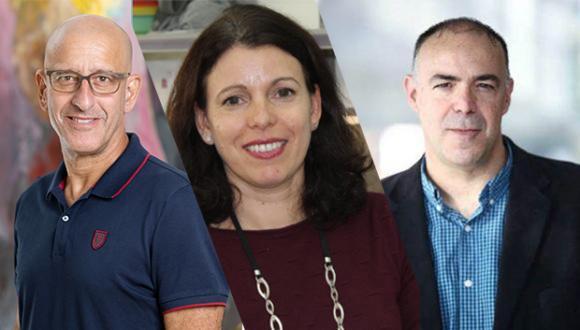International Cancer Day 2021 - Special Project
A World Changing Community in the field of Cancer Research: The TAU Alumni Organization marks International Cancer Day, occurring on February 4, in a combined project that touches the subject from three different angles, to highlight the contribution of TAU alumni and researchers, who are revolutionizing cancer research, one research at a time.
Part One: "I am not the story of my life" - Tamir Gilat marks ten years of dealing with cancer
My name is Tamir Gilat. I was born in 1962, I’m a lawyer and former businessman, a Member of the TAU Board of Governors and the board of the Friends of TAU Association. I’m an alumnus of TAU’s Buchmann Faculty of Law with an MBA from the Kellogg-Recanati International Executive program at TAU’s Coller School of Management. During my law studies, I was the goalkeeper of the Maccabi Tel Aviv football team.
If the original prediction of the doctors who diagnosed me had come true, I wouldn’t be marking this special day with you - the 10th birthday of my new life. My life was supposed to end nine and a half years ago, in the middle of 2011.
In the first week of February 2011 I received my first death sentence. I was diagnosed with two types of cancer (metastatic pancreatic cancer and metastatic kidney cancer). It was the first time I had heard the words, "You only have six months left to live". Shortly after the diagnosis, I underwent nine and a half hours of surgery and some of my internal organs were removed or cut in half... I started chemotherapy for prevention and after 11 treatments I felt that the cancer metastases had spread in my body. My fears came true and I was diagnosed with liver metastases.
A second death sentence within four months, and this time without a right of appeal. It was the second time in my life that I heard the words: "You have about six months left to live" and the first time I heard from my doctor, Dr. Talia Golan from Sheba, the words: "We have no more treatment options for you". That night I went to bed knowing I had to prepare my family to say goodbye. The next day, Dr. Golan called me and offered to join me in a clinical study for women with breast cancer and ovarian cancer who had the BRCA gene. It was decided to add a group of pancreatic cancer patients who also carry the BRCA gene to the clinical trial, which aimed to prolong life by a few months, with a reasonable quality of life. The trial involved 400 patients from Israel and the United States. After 13 months I was informed that the experiment was over, as all participants had passed away. I continued to receive the experimental drug for a cumulative period of 51 months.
In September 2015 I received a third death sentence, this time due to the spread of the metastases throughout my whole body. After another significant operation, in which the rest of the internal organs (except the lungs and heart) were removed or cut in half, I was added to a new clinical trial by Prof. Raanan Berger of Sheba. This time it was an experiment with a groundbreaking drug from the field of immunotherapy. The prognosis was a life extension of up to two years. I have been treated with the drug for over five years and continue to receive it once every three weeks. In addition, I take dozens of pills and shots every day to balance my body.
...Spoiler ...After the long background detailing the complex, rattling and empowering journey on the roller coaster which is my life, I realized that I'm not really the important story I want to share with you. The important story are two drugs, developed thanks to the same two clinical trials in which I participated. Life-saving drugs that are in the Ministry of Health’s medical services basket today. The first, "LYNPARZA" is intended for patients with breast or ovarian cancer and patients with pancreatic cancer - all of whom carry BRCA; The second - the Yervoy and Opdivo cocktail for immunotherapy for melanoma, kidney and lung cancer patients (NSCLC). The story is about Israel's wonderful cancer researchers.
Today we mark International Cancer Day, and I have the privilege to mark it for the tenth time since I became ill. Nine times more than the initial expectation. Every day I take a deep bow to cancer research and the cancer researchers to whom I owe my life. My life story is about those groundbreaking studies that led to the development of the research drugs that saved my life. I am the lab rat proving that cancer research works! The gratitude, the success of the Israeli cancer research and its importance made me volunteer as chairman of the Israel Cancer Research Foundation (ICRF).
One in 2.2 men and one in 2.8 women will develop cancer during their lifetime, and every year about 30,000 people in Israel join the disease cycle. There is no family in Israel that is not directly affected by cancer. I'm an old ‘member’ in the cancer family. I was 23 when my late father died in my arms after a severe battle with cancer when he was just 51. Three and a half years ago my beloved wife Keren, died at the age of 46 after years of heroically coping with metastatic breast cancer.
For 10 years I have been dancing tango with death with humility. 3,650 days of cancer, in which I learned to live with the questions and the uncertainty as a cornerstone of my new life. 3,650 days of trial and error, of fear and hope of pain and joy of side effects and moments of grace. I learned to live each day as if it were my last day. My rebirth summoned into my life the appreciation of gratitude and giving as a way of life. I chose to dedicate my new life volunteering to the subject of cancer. My goal and mission in life is to raise awareness of the importance of supporting the wonderful cancer researchers in Israel and to mentally accompany cancer patients and their families on their difficult path. I am the evidence that cancer research is developing enormously and is happening here and now, and that is why I decided to volunteer and serve as chairman of the Israel Cancer Research Foundation – ICRF.
The Israel Cancer Research Foundation - ICRF was established in 1975 in the United States by Jewish cancer researchers who understood that cancer was going to be the 21st century’s epidemic and that the only way to overcome it was through research.
The foundation is focused on raising funds to fund research by Israel's leading cancer researchers. The existence of the foundation allows researchers to carry out the research and cultivate their professional careers in Israel, and prevent the phenomenon of human capital flight. In its activities, the foundation preserves the vitality of research institutions in Israel, and cultivates the most important resource for all of us - outstanding scientists. The Israel Cancer Research Foundation adds an important pillar to the advancement of cancer research thanks to a unique platform for selecting research proposals: Once a year, a neutral peer committee (PEEREVIEW) of the foundation convenes in the United States, with about 50 leading North American cancer researchers volunteering. The committee examines Israeli cancer researchers’ research proposals based on feasibility and expected impact of the research for breakthrough, and all according to scientific criteria only and without bias. Of about 150 scholarship applications, 25 selected studies are members of the "Dream Team" of the Cancer Research Foundation that year.
Since 1975, the Israel Cancer Research Foundation - ICRF, has distributed a total of 2,569 research grants totaling $ 78,019,667 million to Israel's leading cancer researchers, whose laboratories are located in all of Israel's leading research institutions.
In 2020-2021, the fund supports 71 research scholarships totaling $ 5,151,335 million. 12 of which are outstanding researchers from Tel Aviv University.
From 1990 until today, the foundation has supported the outstanding cancer researchers of Tel Aviv University with a total of $ 9,340,000.
Every outstanding cancer researcher at TAU has been identified and selected during his career by the Foundation for Cancer Research. Partial list: Prof. Gidi Rechavi, Prof. Dan Peer, Prof. Ronit Satchi-Fainaro, Prof. Neta Erez, Prof. shai izraeli, Prof. Carmit Levy, Prof. Itai Levhar, Prof. Moti Ravid, Dr. Lior Mayo and many others, some of whom have received a number of research grants during their careers.
The journey of my new life in the last decade is described in my TED lecture: "Outliving your expiration date"
In my TED lecture I distill my way to a formula I call "The 3 G's", The way that allowed me to live to share with you my story today - the story generated by the Israel Cancer Research Foundation and cancer researchers, the story of worthy GOALS, GIVING as a way of life and living in GRATEDUDE. The story is to live the change and transience in every moment and to learn to die and be born again every day.
Part Two: Prof. Neta Erez’s Laboratory for researching metastasis of breast cancer and melanoma, which trains the future generation of TAU Alumni Researchers
Inspired by Tamir's personal and touching text, we went to review the activity in the laboratory of Prof. Neta Erez, Head of the Department of Pathology at Tel Aviv University's Sackler School of Medicine, one of two TAU Professors to Win the 2020 Nature Research Awards for Mentoring in Science, given by the Springer Nature Group, which is the home of the leading journal Nature.
The prestigious award is given to scientists who excel in mentoring research students in their laboratories, thus contributing to the development of the future generation of science -- in Israel in particular and in the world in general. from our perspective - they are the ones who train the future generation of TAU alumni to become outstanding scientists themselves. The prize was especially moving because the ones who had nominated Prof. Erez for it were the very ones whom she mentored -- the students and alumni of her lab.
So let's start over with some background:
Cancer is a general name for over 100 different types of cancer, which are usually named after the organ or tissue from which they originated. The vast majority of cancer deaths are in fact not a direct result of the primary tumor that in many cases (but not always) can be surgically removed, but as a result of the tumor spreading to other organs of the body, and the formation of metastases.
A malignant tumor is not just a collection of cancer cells, it is actually a multicellular tissue that also contains immune cells, blood vessels and connective tissue that are collectively called the "microenvironment of the tumor." All of these are normal cells that are mobilized by the body to the cancerous growth, and in most cases help it grow by supplying nutrients, growth factors, creating new blood vessels and more.
In recent decades, as a result of intensive global research, much knowledge has been accumulated about the role of the micro-environment in supporting tumors. This knowledge has helped develop new drugs and advanced therapeutic strategies that target, for example, the immune system in the microenvironment and help kill tumor cells by immune cells.
However, as mentioned above, cancer death is most often the result of metastatic spread. There's great importance in metastases, too, to the microenvironment, which varies from organ to organ: for example - cancer cells that have migrated from the breast to the bone, must now "recruit" and communicate with cells in the bone tissue. Therefore, research dealing with the communication between cancer cells and their microenvironment in the metastatic organs and the attempt to block these pathways is of great importance in our ability to understand the metastatic process, to delay or even prevent it.
The research in the laboratory of Prof. Neta Erez, Head of the Department of Pathology at TAU's Sackler Faculty of Medicine, focuses on understanding the early processes that enable the formation of metastases of breast cancer and melanoma (skin cancer) in the lungs, bones and brain.
Studies conducted in Prof. Erez's laboratory in recent years have revealed how cancer cells "corrupt" normal body cells and cause them to "reprogram", which causes them to support cancer cell proliferation by creating inflammatory processes.
In particular, the studies focused on discovering the role of connective tissue cells called fibroblasts. In normal condition, fibroblasts play a key role in healing wounds and tissue damage. Prof. Erez's research has shown that fibroblasts play a key role in mediating pro-cancer inflammatory processes and in inhibiting the immune system capable of attacking cancer cells.
The fibroblasts reside in various tissues of the body, and in case they detect tissue damage they activate the cells of the immune system using substances that they discharge. As part of the same process, they also make the blood vessels more permeable, to allow the immune cells to penetrate the tissue and perform their job. This is, in fact, the body's natural inflammatory pathway in cases of tissue damage. Studies from Prof. Erez's laboratory have demonstrated how cancer cells "stack" on the fibroblasts and cause them to activate physiological wound inflammation and healing programs, to create a supporting environment for their growth in the organs in which metastases then develop.
Molecular characterization of fibroblasts in primary breast tumors, as well as in breast cancer metastases in lungs, revealed overexpression of specific proteins (cytokines) associated with tissue damage, which allowed fibroblasts to alert the immune system cells, which in turn supported cancer cell proliferation. These findings have also been shown to be true in samples from breast cancer patients with metastases in their lungs. Subsequently, Prof. Erez's laboratory used inhibitors of these proteins and demonstrated on mouse models that inhibiting inflammatory pathways in the early stages of metastatic development can significantly inhibit metastatic recurrence, which is the leading cause of death in breast cancer patients.
Additional studies in the laboratory focus on the characterization of inflammatory pathways in the brain and bones, which allow the development of metastases in these organs. A deeper understanding of the processes that enable the formation of metastases will make it possible to identify new targets for sophisticated pharmacological intervention, and to move towards preventing metastatic recurrence, and reducing mortality.
Part Three: The genome editing system that destroys cancer cells
From Prof. Erez's Laboratory we go on to another important laboratory where a breakthrough treatment with no side effects was developed, which may increase life expectancy in brain and ovarian cancer patients.
Researchers at the laboratory of Prof. Dan Peer, TAU VP for R&D and Head of the Laboratory of Precision Nanomedicine at the Shmunis School of Biomedicine and Cancer Research, who was also recently appointed Chairman of Ramot (Tel Aviv University's technology commercialization company), have demonstrated that the CRISPR/Cas9 system is very effective in treating metastatic cancers, a significant step on the way to finding a cure for cancer. The researchers developed a novel lipid nanoparticle-based delivery system that specifically targets cancer cells and destroys them by genetic manipulation. The system, called CRISPR-LNPs, carries a genetic messenger (messenger RNA), which encodes for the CRISPR enzyme Cas9 that acts as molecular scissors that cut the cells’ DNA.
The revolutionary work was conducted by Dr. Daniel Rosenblum together with Ph.D. student Anna Gutkin and colleagues at Prof. Peer’s laboratory, in collaboration with Dr. Dinorah Friedmann-Morvinski from the School of Neurobiology, Biochemistry & Biophysics at TAU; Dr. Zvi R. Cohen, Director of the Neurosurgical Oncology Unit and Vice-Chair of the Department of Neurosurgery at the Sheba Medical Center; Dr. Mark A. Behlke, Chief Scientific Officer at IDT Inc. and his team; and Prof. Judy Lieberman of Boston Children’s Hospital and Harvard Medical School.
The results of the groundbreaking research, which was funded by ICRF (Israel Cancer Research Fund), were published in November 2020 in Science Advances.
“This is the first study in the world to prove that the CRISPR genome editing system can be used to treat cancer effectively in a living animal,” said Prof. Peer. “It must be emphasized that this is not chemotherapy. There are no side effects, and a cancer cell treated in this way will never become active again. The molecular scissors of Cas9 cut the cancer cell’s DNA, thereby neutralizing it and permanently preventing replication.”
To examine the feasibility of using the technology to treat cancer, Prof. Peer and his team chose two of the deadliest cancers: glioblastoma and metastatic ovarian cancer. Glioblastoma is the most aggressive type of brain cancer, with a life expectancy of 15 months after diagnosis and a five-year survival rate of only 3%. The researchers demonstrated that a single treatment with CRISPR-LNPs doubled the average life expectancy of mice with glioblastoma tumors, improving their overall survival rate by about 30%. Ovarian cancer is a major cause of death among women and the most lethal cancer of the female reproductive system. Most patients are diagnosed at an advanced stage of the disease when metastases have already spread throughout the body. Despite progress in recent years, only a third of the patients survive this disease. Treatment with CRISPR-LNPs in a metastatic ovarian cancer mice model increased their overall survival rate by 80%.
“The CRISPR genome editing technology, capable of identifying and altering any genetic segment, has revolutionized our ability to disrupt, repair or even replace genes in a personalized manner,” said Prof. Peer. “Despite its extensive use in research, clinical implementation is still in its infancy because an effective delivery system is needed to safely and accurately deliver the CRISPR to its target cells. The delivery system we developed targets the DNA responsible for the cancer cells’ survival. This is an innovative treatment for aggressive cancers that have no effective treatments today.”
The researchers note that by demonstrating its potential in treating two aggressive cancers, the technology opens numerous new possibilities for treating other types of cancer as well as rare genetic diseases and chronic viral diseases such as AIDS.
“We now intend to go on to experiments with blood cancers that are very interesting genetically, as well as genetic diseases such as Duchenne muscular dystrophy,” says Prof. Peer. “It will probably take some time before the new treatment can be used in humans, but we are optimistic. The whole scene of molecular drugs that utilize messenger RNA (genetic messengers) is thriving – in fact, most COVID-19 vaccines currently under development are based on this principle. When we first spoke of treatments with mRNA twelve years ago, people thought it was science fiction. I believe that in the near future, we will see many personalized treatments based on genetic messengers – for both cancer and genetic diseases. Through Ramot, the Technology Transfer Company of TAU, we are already negotiating with international corporations and foundations, aiming to bring the benefits of genetic editing to human patients.”





